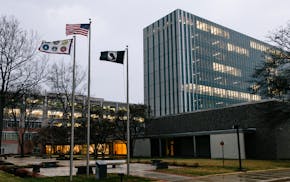A leader in the Feeding Our Future scheme pleaded guilty Thursday to wire fraud and admitted to receiving $11.4 million he claimed was going to meals for low-income children during the COVID-19 pandemic.
Haji Osman Salad, 34, appeared Thursday in U.S. District Court in Minneapolis to plead guilty to one count of wire fraud. His other charges, related to wire fraud and money laundering, will be dismissed as part of the plea agreement.
In 2020, Salad started Haji's Kitchen, a Brooklyn Park-based company that claimed to serve 15.7 million free meals to low-income children between June 2020 and March 2022. The company received millions in federal funding intended to reimburse them for meals. But only a "minimal portion" of the meals they reported were actually served, according to the charges. Millions of dollars instead went to personal uses, such as properties and vehicles, U.S. Assistant Attorney Matthew Ebert said at the hearing.
As part of the agreement, Salad is required to pay back the $11.4 million he received in restitution. He also agreed to forfeit the properties and vehicles he bought with fraud money. His plea came a day after co-defendant Sharmarke Issa, 42, also changed his plea to guilty on one count of wire fraud.
Salad admitted to taking at least $2 million in federal funds for himself to purchase properties, and $400,000 for vehicles. The vehicles included Mercedes and Land Rover SUVs, according to charges.
The defendant admitted to creating shell companies, such as US Halal Foods LLC, that were not actually involved in the food business and were used to launder money as part of the scheme.
In all, Salad was responsible for $19 million in lost funding from the Federal Child Nutrition Program, Ebert said in court.
Salad is the 20th person to plead guilty in the Feeding Our Future federal fraud case, out of the 70 defendants charged in Minnesota so far. Prosecutors have called it one of the largest pandemic-era fraud cases in the United States. The defendants are charged with stealing more than $250 million from federal food programs that reimbursed nonprofits, schools and day cares for feeding low-income children.
The prosecution and defense agreed that Salad could receive a prison sentence between five years and three months, and six and a half years. He was not being held in custody before sentencing.
The recommended prison time took Salad's criminal history into account, which includes one felony conviction for possession of burglary tools in 2010, records show.
That same year, Salad also was accused by the FBI, along with 28 other people, of involvement in an alleged juvenile sex trafficking ring. The Sixth U.S. Circuit Court of Appeals dropped the charges in 2016 after finding that the trafficking claim was likely fictitious and that the two primary witnesses were "unworthy of belief."
Salad and his attorney, Paul Applebaum, declined to comment following the hearing.

Trump races to fix a big mistake: DOGE fired too many people

St. Paul sees 'unprecedented' day care closures, sending families scrambling

One man dead in shooting Friday outside Northtown Mall in Blaine

Four arrested, no one injured in fighting and shooting following Burnsville High School graduation

